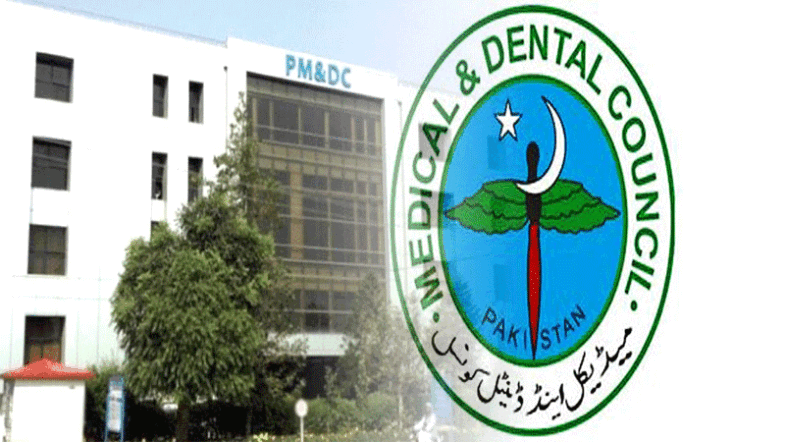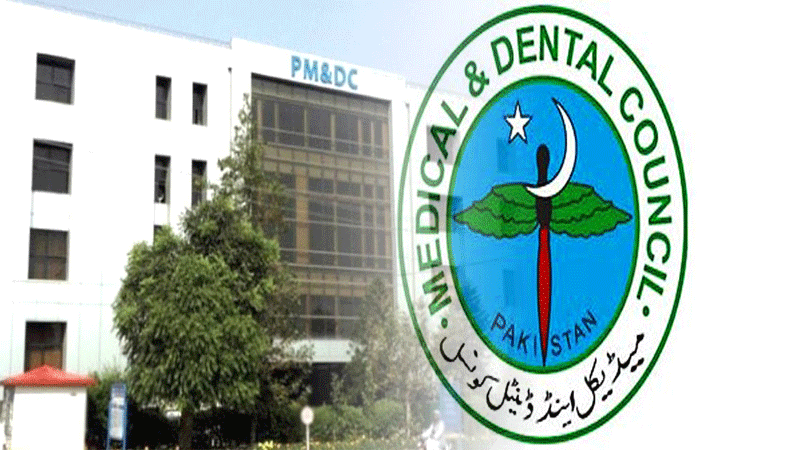Medical students have expressed their delight at restoration of PMDC’s previous status, describing it as a good omen for future of medical and dental education in Pakistan.

A large number of medical students have expressed their delight at the restoration of the Pakistan Medical and Dental Council’s (PMDC) previous status, describing it as a good omen for the future of medical and dental education in Pakistan.
According to them, during the previous government’s tenure of the Pakistan Medical Commission (PMC), most medical students were subjected to extreme stress due to inconsistencies in the commission’s policies.
Similarly, they added, many students who took the MDCAT exam had to face difficulties due to a faulty examination system and the administration’s attitude of not addressing the genuine problems of aspirants, which caused the MDCAT exam to lose its efficacy.
“We had to deal with errors throughout the MDCAT exam process, as even the answer keys were faulty, and many brilliant students were unable to pass, while many failed students were declared passes,” said Atif Kaleem, a student.
He stated that, as a result of this situation, thousands of students have gained admission to universities abroad.
PMDC’s previous status has been restored, and it is likely that medical students will view this as a positive development for the future of medical education in Pakistan.
Another medical student, Basit Khan, stated that the PMC conducted the entry test by arranging it through an external testing authority, denying admission to 55 percent of Sindh students in medical and dental colleges.
He claimed that capable students were denied admission because no criteria for awarding these marks were provided to colleges, and those students were chosen based on a faulty exam held by the PMC.
“Millions of rupees in scams are being investigated against the PMC for awarding contracts to ghost companies that were not even registered at the time of bidding,” he added.
Salma Maroof, a mother of a medical student, stated that the PMDC had periodically capped the tuition fees of all local and international students, whereas the PMC had set no fee limit. “Rather, the PMC removed the fee cap, allowing all colleges to charge whatever they want.”
She claimed that the PMDC had specified the minimum qualifications and experience required for teachers to be appointed in medical and dental institutions but that the PMC had left the faculty to the institutions’ discretion. Institutions humiliated senior faculty members while the future of students was in the hands of junior and inexperienced faculty.
According to PMDC official sources, the composition of the council is nominated in the PMDC bill, with representation from all provinces’ health bodies, universities, or stakeholders to provide input in policy-making for smooth implementation.
“Whereas in the PMC, all members were nominated directly using discretionary powers without regard for merit, while all members of the PMC council had conflicts of interest working in the private sector and were nominated without regard for criteria.”
They claimed that the PMDC was internationally accredited, whereas the PMC encountered numerous difficulties in gaining accreditation from international stakeholders, causing panic among doctors working abroad.
According to sources, local students were registered by PMDC after passing from recognised institutions, and the PMC created three exams for full licence, provisional licence, and temporary licence.
Unlike PMDC’s method of taking NEB exams through one recognised public university to register foreign graduate students, MBBS or BDS local students who previously took five university exams were required to retake the National licencing exit exam before being granted a full licence, according to the sources.
They claimed that during the PMDC era, registration of postgraduate qualifications in or outside Pakistan was granted based on a recommendation from the federal government and an inspection by the Council, whereas the PMC decided to grant registration to only clinical qualifications without any defined criteria.
They stated that any institution seeking recognition with PMDC followed a detailed procedure. As a regulator, the PMDC used to monitor, inspect and regulate all the medical and dental colleges while the PMC handed over the inspections to another public sector organization to conduct inspection of medical and dental colleges.
